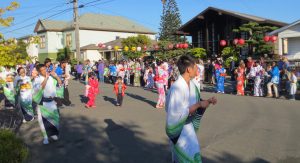
Summertime for many Buddhists means the season of Obon.
Many people associate Obon with Japanese dancing, when crowds of people wear traditional clothes, line up in circles in front of temples and happily dance to folk songs. However, there’s a deeper meaning.
As a Buddhist tradition, Obon is a time to reflect on those people who have passed away, our loved ones and our ancestors, and how our connection to them has shaped our lives. The Obon service is a memorial in memory of those people.
Obon comes from the Ullambana sutra (“Urabon” in Japanese), which tells the story of Mogallana, who envisions his recently deceased mother suffering in a hell-like realm. Mogallana was the Buddha’s disciple, adept at meditation. The Buddha advised him to make offerings to monks in his mother’s memory, which he does, after which his mother is liberated to the Pure Land. Mogallana’s heart fills with joy and he begins dancing.
Our Higashi Honganji temples observe Obon, typically holding an Obon dance, followed the next day by a memorial service. That same weekend, many people visit cemeteries and leave flowers for their loved ones.
The Obon dance has become a popular activity, joined by many non-Buddhists who enjoy it as a kind of Japanese cultural activity. Its essence, however, remains an expression of the Buddha’s teachings. The dance is free and open to all.
The Obon service usually includes a special ritual for “Hatsubon,” which is a “first memorial” for people who have passed away since the last Obon. Families observing Hatsubon are especially invited to attend.
There is no specific date designated as Obon other than summer in general. Therefore, each temple sets its own Obon schedule. Many temples combine Obon weekend with a summer festival, which includes Japanese foods and crafts for sale, children’s games and other activities. In Berkeley, the Higashi Honganji and Nishi Honganji temples host a joint Bon Dance, alternating locations each year.
Whether you’re observing a memorial, reflecting on life and death, interested in Japanese dance or just want to enjoy an important Buddhist tradition, come out and join us. Please check the calendar and specific temples for exact dates and times.

